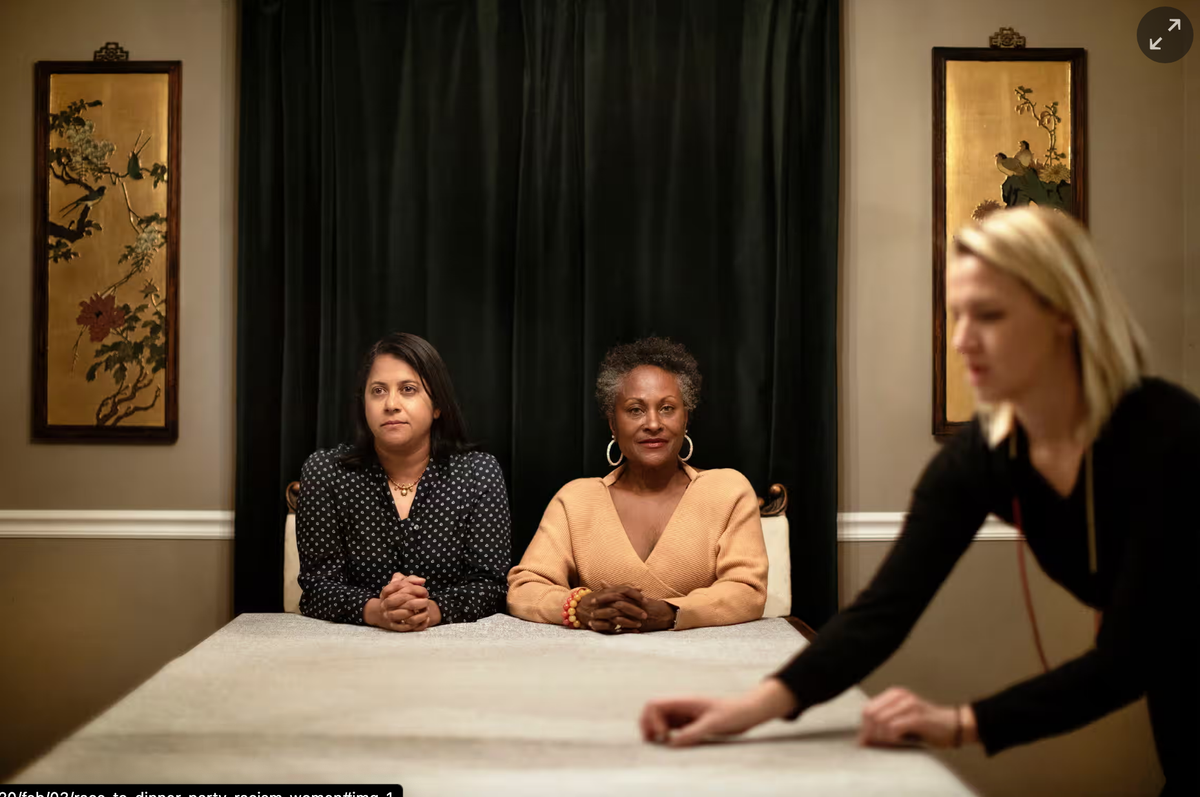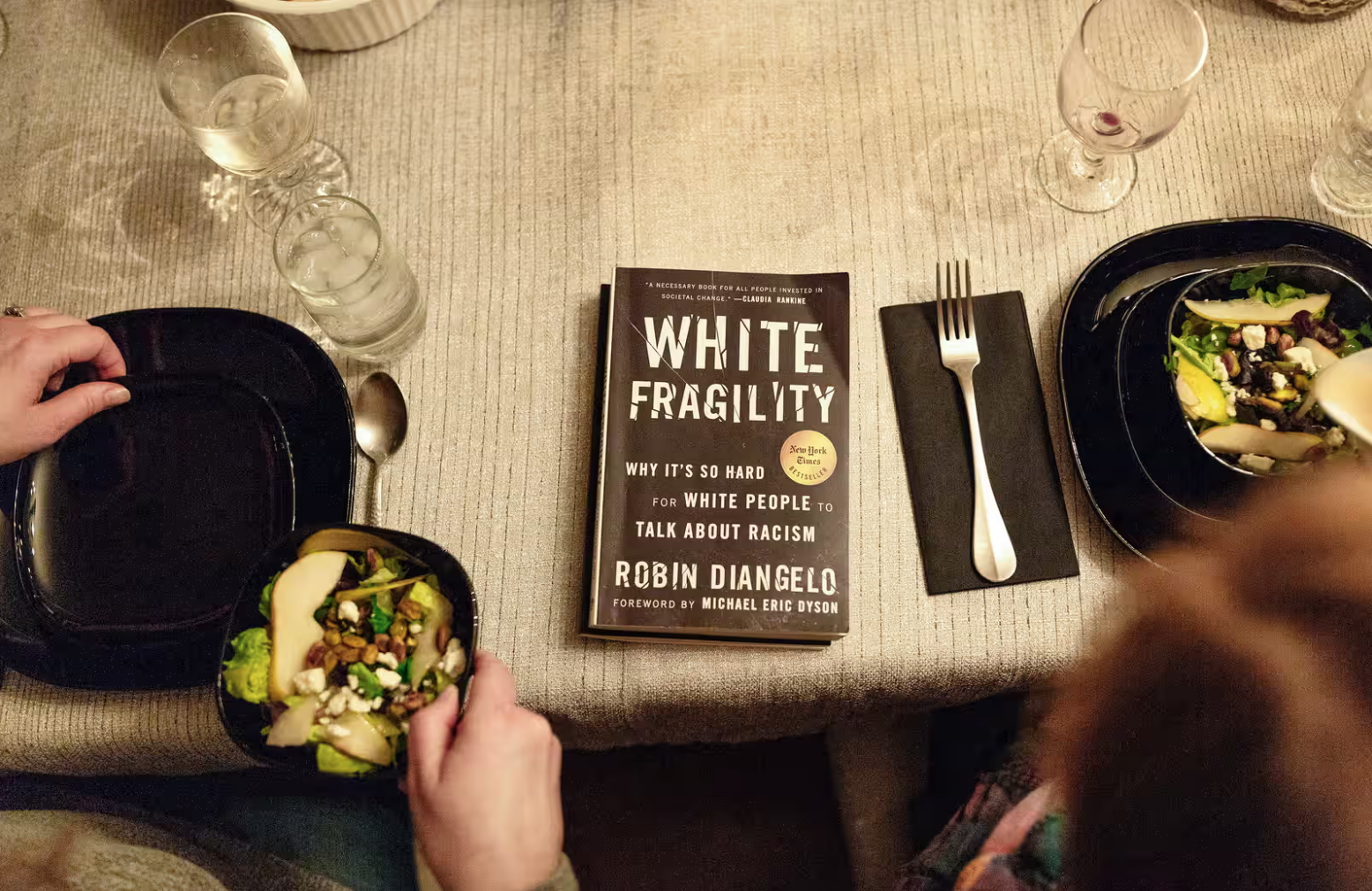Elite White Women Pay Hefty Sums to Dine and Discover Their Inner Racist?
Does Race2Dinner Do More Harm Than Good?

Imagine paying $2,500 to sit at an elegant dinner table, only to be served a heavy dose of self-induced racial guilt. Welcome to Race2Dinner, a controversial social experiment where elite white women confront their “inner racism” under the guidance of facilitators who believe their participation in systemic racism is inevitable — even if they haven’t actively engaged in it.
While this concept may sound absurd to some, these events have gained traction among wealthy, liberal white women who believe they are contributing to dismantling systemic racism. But is this approach truly helping to foster better race relations, or is it, in fact, deepening societal divides by focusing on self-blame and guilt?
What is Race2Dinner?
Race2Dinner events aim to put white women face-to-face with the uncomfortable truths of their privilege and complicity in systemic racism. The dinners often center on the notion that all white people, regardless of intent or action, have contributed to racial oppression. These women are guided through uncomfortable conversations, asked to admit their racial biases, and reflect on how they might be unknowingly perpetuating inequality. Participants engage in role-playing exercises and discussions about white privilege and micro-aggressions, sometimes resembling group therapy sessions more than productive dialogue.

The dinners often come with a high price tag — upwards of $2,500 per person. In return, attendees are encouraged to examine their racial privilege in what some critics argue is a luxury setting that fails to connect with the struggles of those it aims to uplift. But the question remains: Does Race2Dinner offer real solutions, or does it merely create a cycle of guilt and blame without fostering lasting change?
The Impact of White Guilt
One of the key criticisms of Race2Dinner is its reliance on guilt as a motivator for change. Wealthy participants are encouraged to feel guilty for their privilege and for the role they may have unknowingly played in systemic racism. But can guilt alone lead to meaningful action?
Some argue that overwhelming guilt can be counterproductive. When individuals are made to feel excessively guilty, they may be less likely to engage in constructive actions that contribute to real-world solutions. Instead of becoming motivated to address systemic inequalities, they may simply try to alleviate their personal discomfort by making performative gestures, such as posting on social media or participating in events like these dinners, without addressing the perceived root of the problem.
Performative Activism or Genuine Change?
Critics often point out that Race2Dinner may represent the height of performative activism — engaging in symbolic gestures that do little to create tangible change. At these dinners, wealthy participants may feel a sense of moral superiority for having confronted their privilege, but are they truly making a difference?
The concern is that these events may serve more to alleviate the conscience of the participants than to bring about real social reform. Instead of taking steps to dismantle their view of systemic racism — such as advocating for policy changes, supporting grassroots organizations, or using their resources to uplift marginalized communities — these women may leave feeling they’ve done their part by merely engaging in self-reflection.

The focus on individual guilt in these settings can sometimes overshadow the larger, systemic issues at hand. It’s fair to question whether wealthy white women, who often haven’t experienced the day-to-day struggles many others face, are the right people to spearhead societal change. They didn’t create racism and probably don’t actively contribute to it in their daily lives. Frankly, the entire approach seems more like a money grab than an opportunity for self-reflection than a genuine solution to racial issues. But perhaps that’s missing the point altogether.
Is Race2Dinner Alienating Potential Allies?
Another concern is whether Race2Dinner’s emphasis on guilt and blame could alienate potential allies in the fight for racial equality. By focusing so heavily on white women’s complicity in systemic racism, the dinners may inadvertently foster resentment and defensiveness rather than solidarity.
While it is essential to confront uncomfortable truths about privilege and power, doing so in a way that isolates and shames individuals can be counterproductive. Instead of building bridges between communities, this approach may deepen divides, making it harder to foster the kind of collective action needed to bring about real change.
The Potential for Harmful Stereotypes
Race2Dinner also runs the risk of reinforcing harmful stereotypes about both white people and people of color. By placing the onus of systemic racism solely on individual white women, the dinners may perpetuate the idea that racism is an individual moral failing rather than a societal issue rooted in history, policy, and institutions.

Moreover, the dinners may also contribute to the stereotype that people of color are helpless victims who require white saviors to solve their problems. This dynamic can further entrench paternalistic attitudes rather than promoting equality and empowerment for marginalized communities.
Could There Be a Better Way?
While the intention behind Race2Dinner may be to spark difficult but necessary conversations, it’s worth asking whether there are more effective ways to foster racial reconciliation. Instead of focusing solely on guilt and blame, conversations about race could emphasize the shared responsibility of all individuals to combat racism and work towards justice.
Perhaps a more productive approach would involve empowering participants to take action — whether through advocacy, education, or support for community-based initiatives — rather than simply focusing on their personal guilt. By shifting the conversation from blame to solutions, we might foster a more inclusive and collaborative effort to address systemic inequalities.
Conclusion: Does Race2Dinner Do More Harm Than Good?
At its core, Race2Dinner aims to challenge white women to confront their privilege and complicity in systemic racism. But by centering the conversation on guilt and blame, it risks alienating potential allies, reinforcing harmful stereotypes, and promoting performative activism rather than real change.
The question remains: Does this approach do more harm than good for race relations? While it’s crucial to have difficult conversations about race and privilege, those conversations must also lead to meaningful action. The real challenge is to ensure that these dialogues aren’t just about alleviating personal guilt but about creating lasting, systemic change. Whether Race2Dinner achieves that goal is still up for debate.





